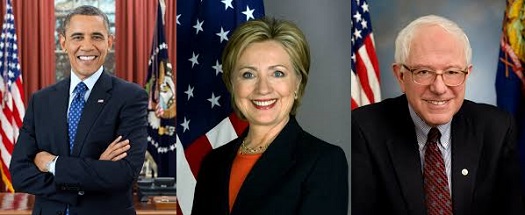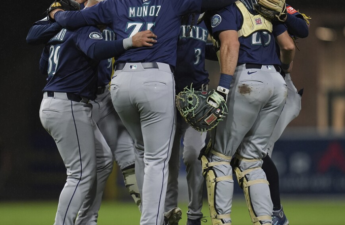“My understanding is, is you’ve got some of the same organizers now going back into these communities to try to clean up in the aftermath of a handful of criminals and thugs who tore up the place.”
-Barack Obama, on the Baltimore unrest, 28 April 2015
“Every nation has to either be with us, or against us.”
-Hillary Clinton, 13 September 2001
Many were shocked in the last week to hear African-American leaders, from the White House to the streets of Baltimore, utilize the word “thugs”. The word has become sort of a proxy slur in recent years, a way people have of painting people they fear with the same broad brush, whether those people pose any sort of danger or threat or not. It’s a little like using “terrorists” to describe anyone on the international scene with whom one disagrees, though “thugs” is often more liberally applied to an entire race since the n-word has really fallen too far out of fashion.
How can people of that same race being victimized by the use of the word thugs in this context be using it themselves? What sort of self-denial is this? Wasn’t the whole hope of having a Black mayor in Baltimore, a Black President in DC, to change the cultural landscape so things like this would never be heard?
The problem, unfortunately, seems to be the opposite. Ask any radical African-American activist how they feel about the Obama Presidency. (Or, frankly, any radical activist full-stop). Despite some glimmers of a leftist that have peeked out in the outset of the back half of his lame-duck term, Obama remains a staunch moderate to a fault, calmly pausing between words to ensure he doesn’t come off as rash, angry, or frustrated, or even someone who could be confused with having a particular interest in the fate of minorities nationwide. When he has spoken up for minorities, they’ve often been other minority groups than his own, appointing a Hispanic to the Supreme Court and sticking his neck out for an executive order on extremely mild immigration clemency. He has gone out of his way to never take an action that could be confused for doing things differently because of his race.
This is understandable, if unfortunate. Obama rightly understands that he’s been under an extremely focused microscope and that many lingering racists would attempt to find anything in his Presidency possible to justify never electing another Black President. He has no interest in being the last Black President, so it’s vital to him to be seen as functionally no different than any other President. The only problem is that many many people who voted for him, who made his election possible, kind of wanted him to be a Black President. Or to at least have enough perspective from his upbringing to do more than speak of it anecdotally, interlaced with words like “thugs.” That maybe he would carve out some time away from the drone-strike kill-list to take on the disproportionate allocation of prisons, the death penalty, police oppression, or poverty on people who grew up looking like him.
This gets to the very core of whether identity matters or means anything in our society. Yes, there is something cool about Barack Obama’s ability to be elected as an African American man (technically he’s more Multiracial, but whatever, racial constructs are stupid) in this country. I didn’t vote for him because of his commitment to continue the war in Afghanistan, but even I trembled a bit watching him speak in Chicago in 2008. But if his Presidency is dictated by a fear of speaking out on issues pertinent to his community, does it matter? I mean, other than a technical self-congratulatory American footnote, are we any better off for having elected a Black President who is terrified to do anything about the problems disproportionately facing the Black community? If the best he can offer as a legacy is not screwing up so badly that people write off Black candidates in the future and then maybe that next Black President does something about injustice and inequality in 2032, is that really the change we can believe in?
Which brings me to the question of Hillary Clinton. Back in the day, there was a belief that electing women would make a difference because women might be different, on balance, in some way in their policies. Women might be disproportionately likely to listen, to compromise, to seek a peaceful solution to problems that men would, on average, want to pull out the big guns for. While the last 20 years have brought scores of women leaders in nations across the globe, the vast majority of them have gotten elected by demonstrating themselves to be even tougher than their male counterparts. Think fast! Who comes to mind as national leaders for women? Margaret Thatcher and Angela Merkel, I’m betting. Two staunchly conservative, hard-line, tough women. And Hillary Clinton is cut from the same mold.
Look, women can be tough. Women can and should be whatever they want to be. The problem is that, to find political success in the modern Western world, women have to be tough. Clinton and her counterparts are terrified of being painted with traditional female stereotypes, being labeled as weak and conflict-avoiding and passive, so they contrast themselves with militaristic vision and aggression. The result is something like the Falklands War, one of the most pointless bloodbaths of the 1980s (and that’s saying something), where Thatcher had to establish herself as willing to go to war when provoked just so people wouldn’t think the reason she didn’t was because of her chromosomes. One of the key reasons I don’t support Hillary is she’s made it abundantly clear that she would eagerly find a war to start just to establish that the first woman President in the United States isn’t afraid of starting a war. It’s like those Geico ads – “When you’re the President, you start a war. It’s what you do.” And she sure as hell isn’t going to break that trend and have people think it’s because she’s not a man.
It’s hard enough for people to imagine electing a woman President in this country, which is kind of a stupefying fact. That reality will fade as my generation continues to cross the 35-year-old line, just like gay marriage has turned on its head, marijuana legalization will be right behind it, and hopefully (please God) some socioeconomic justice will come behind that. We’ve done a good job ensuring that our grandchildren will all consider us rabidly myopic bigots. But if the only slots for women are in the Thatcher/Merkel/Clinton vein of tough-as-nails ready-to-drop-bombs hell-or-high-water genre, are we really making space for diversity in our electorate?
Here’s the problem with Obama avoiding talking about his community and Clinton refusing to be seen as softer on anything: they become totally indistinguishable from the traditional angry old white man model of politics. So if we’re getting technical diversity of identity, I guess that’s some technical version of progress. But when all those people are in every way other than appearance indistinguishable from the traditional make-up and approach of angry old white men, is it worth it? Is it meaningful change?
Which brings us to the supreme irony of the 2016 election coming up. His name is Bernie Sanders. He is the oldest and whitest candidate (though admittedly perhaps not the manliest). And he is the only person in the race for either major party taking a different approach to US policy than the traditional I-am-the-hammer, the-world-is-my-nail approach to American hegemony. Even Rand Paul, son of Ron, is out there carrying the rhetoric of the War on Terror and surveillance without end. And it takes an old white man to bring us real Socialism, the kind of policies that insensate Republicans have somehow confused for the center-right Presidency of Barack Obama.
Defenders of Obama and Hillary might easily say that only an old white man could be a Socialist in today’s political landscape. That a minority or a woman bringing that kind of rhetoric an perspective would do a disservice to their entire class. But I think this is bunk for two reasons.
1. Racists and sexists and naysayers will always find ammunition for their warped perspective. Barack Obama’s Presidency, at least before this year, has probably mapped out just to the right of GW Bush’s (other than perhaps Supreme Court appointments). He has extended the War on Terror, initiated violent interventions in countless countries, ramped up government secrecy while punishing those who speak out against it, refused to take meaningful steps on environmental protection, and backed Wall Street and big corporations at every opportunity. And yet the naysayers and racists have branded him a Muslim, a Socialist, a Kenyan national, and a provocateur. Since before he was elected, I have been saying that my ideal President is the Republican caricature of Obama. That’s who I think this country really needs, but he is totally distinct from the actual Obama in every way. Obama has taken every pain to be as moderate and uninteresting as possible and is still hated by people who don’t like his identity. That was always going to happen. He might as well have tried to do some good first.
2. If we elect people of traditionally under-represented class, but the only slots for them are for people who are indistinguishable in policy from traditional angry old white men, are we actually diversifying? Is this frankly any different than demanding that a minority or woman “pass” as a white man? If they have to conform to the dominant cultural standard to be liked, is that truly cultural diversity? And if the standard they set demands that future Blacks or women or people who are different must conform rigidly to the old white male paradigm, how are we progressing past that paradigm? And isn’t it the paradigm that matters? If we have a Black man still oppressing Blacks, is it meaningful that we elected a Black President? If a woman sets the precedent that the first female President only got to power by being the wife of a popular President, are we really standing up for women and their right to be equal to men?
Maybe I’m the wrong person to speak about these issues as a white man. I’m sure there are some who would think so and believe this to be a trite undermining of the accomplishments of Obama and Hillary to overcome the incredible obstacles they’ve faced. My fear, as someone who hates the established order of American politics as they’ve unfolded since 9/11, who hates the traditional patriarchal approach to war and poverty and politics, is that our obsession with the identity of a person has actually set back diversifying or changing policies. The patriarchy can still use a woman to establish patriarchal policies. And we should not be falling all over ourselves to celebrate electing people who look different if that difference is only an appearance.



